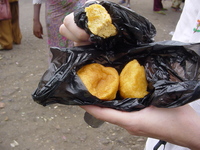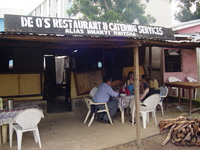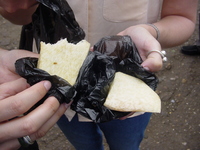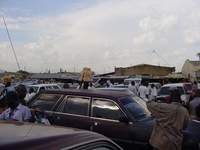Nigerian glossary
Illustrated glossary of Nigerian terms
This is a collection of Nigerian words and phrases I’ve used in the Nigeria section of the site. I’ve included a rough pronunciation for some of the terms.
- Akara
 Small puffy fritters made from mashed black-eyed beans. Depending on the oil they’ve been cooked in they can be either golden-yellow (groundnut oil) or red (palm oil). There’s a recipe here
Small puffy fritters made from mashed black-eyed beans. Depending on the oil they’ve been cooked in they can be either golden-yellow (groundnut oil) or red (palm oil). There’s a recipe here- Baturi
- Hausa for white man. See oyinbo.
- Beer
- There are two common brands of beer here: Star and Gulder. They’re both standard lagerish stuff, with little to distinguish between them, but I prefer Gulder. You can also get locally brewed Heineken and Guinness (nothing like the Guinness outside Africa!). Beer usually comes in 600ml bottles and is about 6% alcohol. Beer is harder to get in the Sharia states, but see Mummy Market.
- Boy
- In Nigeria the term “boy” is usually used to refer to somebody junior in position rather than junior in age. You’ll often hear big men talking about some “small boy”, who could easily be in his thirties.
- Brokan/Broken
- Another name for pidgin.
- Bush bar
- An informal-economy bar. Usually some plastic chairs on an unused plot, serving beer and sometimes food. See also chop house.
- Chop house
 An informal-economy restaurant. These tend to spring up on any unused land and can be anything from a few plastic chairs and tables under a tree to a wooden shack. The food usually features rice and stew, garri, semovita, pounded yam and a variety of soups. “Chop” means eat in Pidgin.
An informal-economy restaurant. These tend to spring up on any unused land and can be anything from a few plastic chairs and tables under a tree to a wooden shack. The food usually features rice and stew, garri, semovita, pounded yam and a variety of soups. “Chop” means eat in Pidgin.- Dash
- This means something like “present” but is also used to describe bribes. When you buy something at the market you often get a dash from the stallholder, for example an extra orange, and it’s fairly common to actually ask for a dash. People also talk about “dashing” the police at checkpoints 20 Naira to let them through.
- Drop
- Car taxi. When you arrive at one of the Abuja motor parks you’ll usually immediately be surrounded by a crowd of men offering “drop by car”. See also okada.
- Fried Yam
 Slices of yam, fried and salted. Usually sold at roadside stalls and a great snack on long journeys. See also akara.
Slices of yam, fried and salted. Usually sold at roadside stalls and a great snack on long journeys. See also akara.- Garri
- Made from cassava, which is grated and then dried and ground up into a yellowish flour. This is then cooked and served as a big, yellowish, sticky blob. Also known as Eba. See also pounded yam, semovita.
- Geopolitical Zones
- Nigeria is a federation of states, similar to the USA. For convenience the 36 states have been grouped into six “geopolitical zones”: Northwest, North-central, Northeast, Southwest, South-South and Southeast.
- Harmattan
- The Harmattan is the cold, dry wind that blows south from the Sahara during dry season. It brings with it clouds of dust from the desert. Read more at answers.com
- Hausa
- The main language in the north of Nigeria. Also the name of one of the main ethnic groups in that part of the country. See also Igbo/Ibo, Yoruba and Pidgin.
- Igbo/Ibo
- The main native language in the south-east of Nigeria. See also Hausa, Yoruba and Pidgin.
- Indomie
- The main brand of instant noodles in Nigeria, Indomie has become a generic word for noodles. Stalls in the streets often sell Indomie mixed with egg and then fried, which is a cheap and filling meal.
- Light
- When the mains power goes off people say that NEPA “don take light” and when it comes back “don bring light”. Unreliable light affects peoples lives quite a lot, if you live in an especially bad area you can’t do much after sunset unless you have a generator.
- Machine
- See okada.
- Maltina
- Brand name of one of the local malt drinks. These seem to be quite popular in countries with religious or economic objections to alcohol. Various breweries produce their own versions, such as Guinness Malta. See also beer.
- Minerals
- Soft drinks (Coke, Fanta, Seven-Up, bitter lemon, etc.) are called minerals in Nigeria.
- Motor park
 This is where you go to catch a bush taxi (usually an ancient Peugeuot 505) between towns. In Abuja they’re mostly run by the National Union of Road Traffic Workers (NURTW). Cars have a sign indicating where they’re going and go as soon as they’re full. If you’re going to a less popular destination you can either wait for the car to fill up or negotiate a price for the empty seats.
This is where you go to catch a bush taxi (usually an ancient Peugeuot 505) between towns. In Abuja they’re mostly run by the National Union of Road Traffic Workers (NURTW). Cars have a sign indicating where they’re going and go as soon as they’re full. If you’re going to a less popular destination you can either wait for the car to fill up or negotiate a price for the empty seats.- Mummy Market
- Large towns in the Sharia states usually seem to have a Mummy Market around the Army barracks or Air Force base. As this is federal land the sale of alcohol is allowed and they’re also centres for prostitution. In some towns there are alternatives, such as the Customs Officers’ Mess in Sokoto (much nicer atmosphere).
- NEPA
- National Electric Power Authority, the state electricity provider. Notorious for a lack of reliability, in some parts of the country the power can be off for days on end. Also known as No Electric Power Always. Also used as a synonym for electricity, see also light.
- NYSC
- National Youth Service Corps, a compulsory national service scheme for graduates in Nigeria. Participants first attend a military-run induction camp, with lots of marching and shouting, and are then sent off to serve their country, often as underpaid and unqualified teachers. In theory corpers should be sent far from their home state, to learn about other parts of the country, but if they have rich parents a cushy posting close to home can usually be arranged. NYSC uniform seems to have been designed to be as hideous as possible, ill-fitting khaki trousers and jacket, cheap NYSC-logo T-shirts and bright orange boots.
- Oga
- Means something like “master” or “boss”, I’m not sure what language it came from but it’s used throughout Nigeria. Used by people to refer to their “superiors”, in a similar way to “sir” used to be in English.
- Okada
- Motorbike taxi, they seem to be found everywhere. See also drop, machine.
- Oyinbo (oyeebo)
- White man (or woman), applies to anyone who is not black, including (confusingly for the Philippinos) Asians. See also baturi. It apparently comes from the Yoruba language.
- Pepper soup
- More like what British people would think of as soup but usually very, very spicy. Normally contains lumps of meat or fish, or even a whole goat’s head (isi ewu).
- Pidgin
- One of the local languages, originally a mish-mash of English, native languages and various others but it has now developed a life of its own. Also known as “brokan” (broken English).
- Pounded Yam
- My favourite of the “sticky blob” staples. This is made by boling yam and then pounding it in a large mortar and pestle (the pestle often being over a metre long). Tastes a bit like mashed potato but is stickier. See also garri, semotiva.
- Semovita
- One of the staples of the Nigerian diet, along with garri, pounded yam and other variations. A processed form of cassava which is cooked up into a big, white, sticky blob.
- Shawarma
- A popular fast food meal brought to Nigeria by the Lebanese community. This is similar to what we’d call a doner kebab in the UK, usually with either beef or chicken, wrapped in Lebanese flat bread.
- Soup
- This isn’t what people coming from the UK would usually think of as soup, more like what we would call stew. It comes in different varieties, some with intestines (white soup), others with an interesting slimy texture (containing okra). Not the same as stew.
- Stew
- This isn’t what people coming from the UK would usually think of as
stew, more a kind of greasy, tomatoey sauce. Stew is usually quite spicy and can sometimes be spicy enough to bring tears to the eyes. - Suya
- Suya is usually beef pounded thin and then roasted on sticks. It’s very common roadside food, especially in the North, and is usually good. Depending on the person making it it can be painfully spicy. Less commonly you find goat-meat suya or even liver.
- Yoruba
- The main native language in the south-west of Nigeria. See also Hausa, Igbo/Ibo and Pidgin.
![[Nigeria]](/media/Flags/NGflagSmall.png)